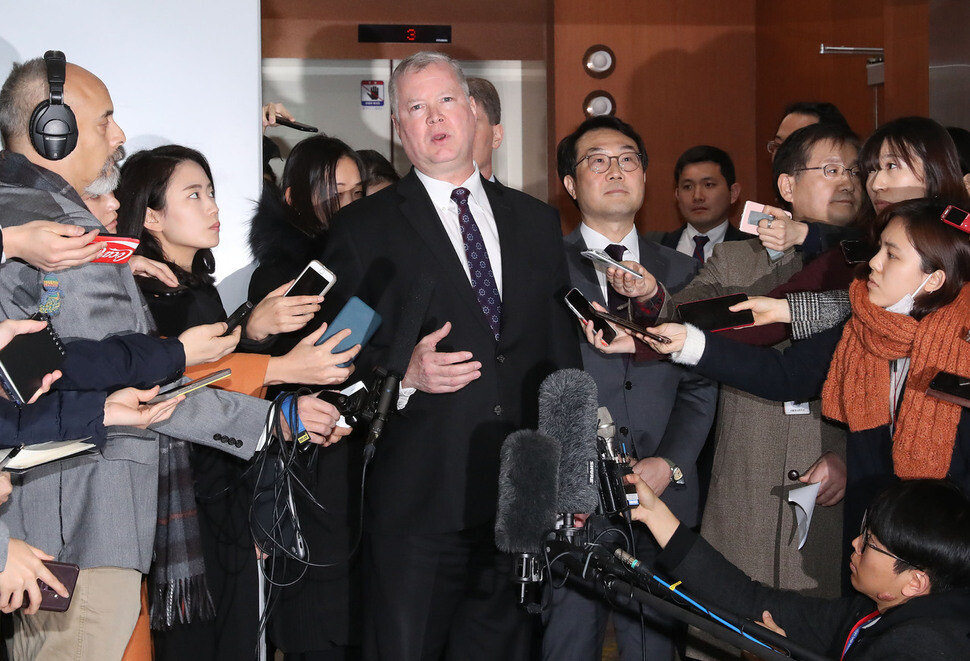hankyoreh
Links to other country sites 다른 나라 사이트 링크
US approves inter-Korean railway groundbreaking ceremony

The US has been sending conciliatory messages to North Korea with a recent South Korea visit by State Department Special Representative for North Korea Policy Stephen Biegun.
Following previous hints that it might allow US private groups to provide humanitarian aid to the North, Washington agreed on Dec. 21 to allowing a groundbreaking ceremony to go ahead as scheduled for an inter-Korean railway and road linkage and modernization effort.
Meeting with reporters after a second South Korea-US working group meeting on Dec. 21 with Biegun during the latter’s visit to discuss North Korea’s nuclear program and related issues, Ministry of Foreign Affairs Special Representative for Korean Peninsula Peace and Security Affairs Lee Do-hoon said, “The railroad linkage project and related groundbreaking ceremony were given the go-ahead to proceed as scheduled in the working group today.”
With the ceremony scheduled for Dec. 26 at Panmun Station in North Korea’s Kaesong, discussions needed to be concluded quickly on event-related items that might be in violation of UN Security Council sanctions against the North. Based on its amicable agreement with the US on Dec. 21, the Ministry of Foreign Affairs immediately began procedures to request a UNSC exemption on sanctions.
The two sides also agreed to go ahead as planned with an inter-Korean remains exhumation project and efforts to provide the medication Tamiflu to the North. The agreement was taken as signal the US’ approval of an exemption on sanctions for various types of digging equipment needed for the project to exhume POW/MIA remains from the Korean War, which is scheduled to begin next April according to a military agreement reached between South and North Korea on Sept. 19.
“This could be seen as marking the start of a deferment of North Korea sanctions when it comes to inter-Korean relations,” said Koo Kab-woo, professor at the University of North Korean Studies. “It is laudable in a sense,” Koo added.
With the US indicating plans to increase humanitarian aid to the North, many were watching to see if further details would also emerge on plans to provide US$8 million in support from the Moon Jae-in administration through an international agency – part of an effort to support public health and nutrition for mothers and children. But sources reported that the two sides did not reach the stage of detailed discussions.
In remarks after the meeting, Biegun clearly stated that the US has no plans to loosen its sanctions against the North or those imposed by the UNSC.
“However, within the context of the engagement we had with the DPRK, we are prepared to explore a number of other things that could build trust between the US and North Korea,” he continued.
While Biegun reaffirmed Washington’s previous opposition of loosening of sanctions until denuclearization is achieved, his remarks were also seen as hinting that the US could offer various corresponding political and diplomatic measures as North Korea takes steps to denuclearize.
By Kim Ji-eun, staff reporter
Please direct comments or questions to [english@hani.co.kr]

Editorial・opinion
![[Editorial] Does Yoon think the Korean public is wrong? [Editorial] Does Yoon think the Korean public is wrong?](https://flexible.img.hani.co.kr/flexible/normal/500/300/imgdb/original/2024/0417/8517133419684774.jpg) [Editorial] Does Yoon think the Korean public is wrong?
[Editorial] Does Yoon think the Korean public is wrong?![[Editorial] As it bolsters its alliance with US, Japan must be accountable for past [Editorial] As it bolsters its alliance with US, Japan must be accountable for past](https://flexible.img.hani.co.kr/flexible/normal/500/300/imgdb/original/2024/0417/6817133413968321.jpg) [Editorial] As it bolsters its alliance with US, Japan must be accountable for past
[Editorial] As it bolsters its alliance with US, Japan must be accountable for past- [Guest essay] Amending the Constitution is Yoon’s key to leaving office in public’s good graces
- [Editorial] 10 years on, lessons of Sewol tragedy must never be forgotten
- [Column] A death blow to Korea’s prosecutor politics
- [Correspondent’s column] The US and the end of Japanese pacifism
- [Guest essay] How Korea turned its trainee doctors into monsters
- [Guest essay] As someone who helped forge Seoul-Moscow ties, their status today troubles me
- [Editorial] Koreans sent a loud and clear message to Yoon
- [Column] In Korea’s midterm elections, it’s time for accountability
Most viewed articles
- 1[Column] The clock is ticking for Korea’s first lady
- 2Samsung barricades office as unionized workers strike for better conditions
- 3[Editorial] When the choice is kids or career, Korea will never overcome birth rate woes
- 4[Guest essay] How Korea turned its trainee doctors into monsters
- 5Why Israel isn’t hitting Iran with immediate retaliation
- 6S. Korea, Japan reaffirm commitment to strengthening trilateral ties with US
- 7Japan officially says compensation of Korean forced laborers isn’t its responsibility
- 8[Editorial] As it bolsters its alliance with US, Japan must be accountable for past
- 9Korea, Japan jointly vow response to FX volatility as currencies tumble
- 10‘Right direction’: After judgment day from voters, Yoon shrugs off calls for change